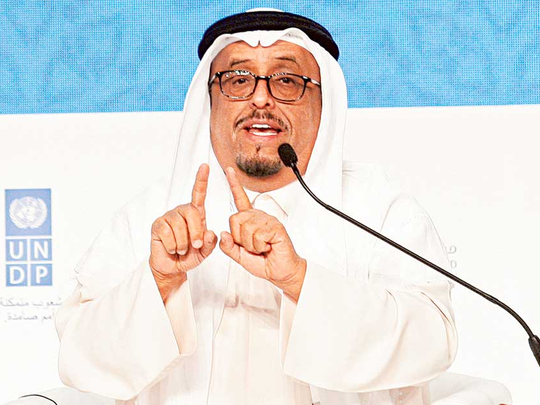
Dubai: The education system in the Arab world, which graduates people like Daesh and a woman who stabbed an American teacher who educates our children must be reconsidered, said Lt Gen Dahi Khalfan Tamim, Deputy Chairman of Police and General Security in Dubai.
Lt Gen Dahi made the statement at the closing session of the First Knowledge Conference on Tuesday, titled ‘The status of Arab Knowledge in light of the Arab Spring’.
“The problem in the Arab world is that the education system has failed to graduate people who are ready to work in our labour market.”
Lt Gen Dahi said Arab youth are taught only theory and, once they graduate, if the government does not find them a job, they become a burden on society.
“Our education systems graduated Daesh and [Abu Baqr Al] Baghdadi who behead people on camera and spread it on social media, it graduated suicide bombers and it graduated people like the woman who stabbed an American teacher who came all the way from her country to teach our children.”
Lt Gen Dahi said the solution is to review the current Arab education system and change it. “For example we have Islamic scholars from different sects cursing each other instead of teaching Islam as a religion of tolerance. We are raising our children to hate each other.”
Lt Gen Dahi said Arab countries should consider adopting education systems similar to the West where children are taught about equality and are punished if they show intolerance of other religions. “They are taught that such actions are punished by law from a very young age.”
Lt Gen Tamim stressed that social media also has had a big role in spreading hate and intolerance.
Dr Essam Sharaf, the former Prime Minister of Egypt, also a panellist at the session, said education is not the only influencer.
“Knowledge is not only education; it is also society, family and media. Our regional systems are fragile but they are there. We must support and educate our youth to not become the Daesh of the future.”
Television reporter Riza Khan, on the other hand, said what was interesting about the Arab Spring was the emotions tied to it. When it comes to the status of Arab knowledge after the revolutions, Khan said there are many issues that were faced.
“First, the people affected by the revolution are too concerned with their security to focus on the education system and this has a major impact on education.”
The second issue Khan mentioned is the brain drain that can also be caused by insecurity.
“Third is the issue of illusion. Some youth in the Arab world think ‘I am trying to build a future but there are no options’, so the risk is that they go to extremism.” He said commitment is needed to build a successful Arab foundation.
Renowned Egyptian journalist Hamdy Kandil said the youth in Egypt have not fulfilled their goals as they have removed a president but they did not change the system.
He also said the role of media requires deep study and assessment as it plays the role of exaggerator at times. “Arab media has played a negative role in revolutions and had a major role in making it more complicated and had a negative effect on it.”
Professor Peter Giblin, member of the Board of Trustees of the American University in Cairo, said knowledge is a combination of information and judgement.
“Information comes from all of us but what you do with it is what makes it knowledge.”












